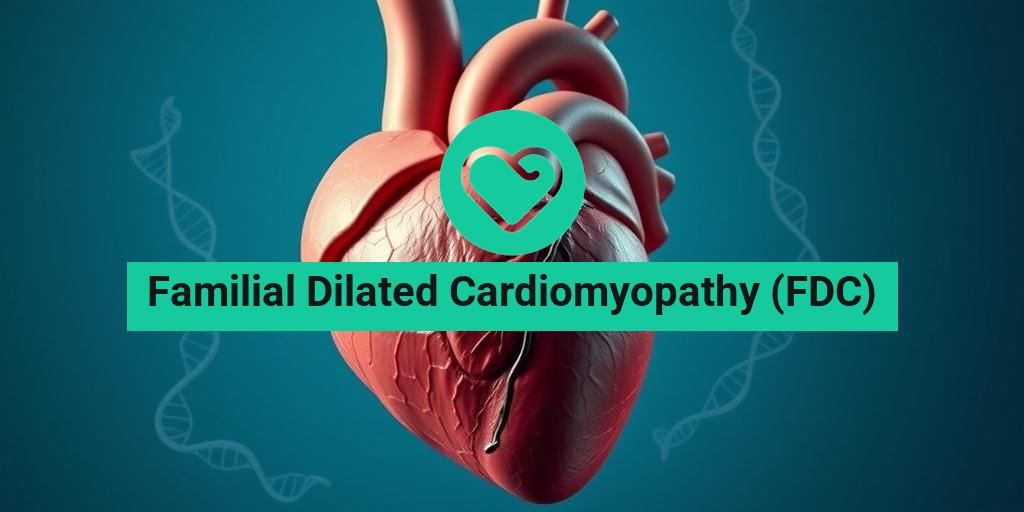What Is Familial Dilated Cardiomyopathy?
Familial Dilated Cardiomyopathy (FDC) is a genetic heart condition that primarily affects the heart muscle, leading to its enlargement and impaired function. This condition is a form of dilated cardiomyopathy (DCM), which is characterized by the heart’s inability to pump blood effectively due to the dilation of the heart chambers. FDC is inherited, meaning it can run in families, and understanding its implications is crucial for early diagnosis and management.
Understanding the Genetics of FDC
FDC is often caused by mutations in genes that are essential for the structure and function of heart muscle cells. These genetic mutations can disrupt the normal functioning of the heart, leading to symptoms that may not appear until later in life. If you have a family history of heart disease, particularly DCM, it’s important to discuss this with your healthcare provider, as genetic testing may be recommended.
How Common Is Familial Dilated Cardiomyopathy?
While the exact prevalence of FDC is difficult to determine, it is estimated that familial cases account for approximately 20-35% of all dilated cardiomyopathy cases. This highlights the importance of awareness and screening, especially for individuals with a family history of the condition.
FDC Symptoms
The symptoms of Familial Dilated Cardiomyopathy can vary significantly from person to person, and some individuals may not experience any symptoms until the condition has progressed. Here are some common symptoms to watch for:
Common Symptoms of FDC
- Shortness of Breath: Many individuals with FDC experience difficulty breathing, especially during physical activity or when lying down.
- Fatigue: A general feeling of tiredness or lack of energy is common, as the heart struggles to pump blood effectively.
- Swelling: Edema, or swelling in the legs, ankles, and feet, can occur due to fluid retention.
- Palpitations: Some may experience irregular heartbeats or a sensation of the heart racing.
- Chest Pain: Discomfort or pain in the chest can occur, although it is less common.
When to Seek Medical Attention
If you or a family member experiences any of these symptoms, especially if there is a known family history of heart disease, it is crucial to seek medical attention promptly. Early diagnosis and intervention can significantly improve outcomes and quality of life.
Living with FDC
Managing Familial Dilated Cardiomyopathy often involves a combination of lifestyle changes, medication, and regular monitoring by healthcare professionals. Patients are encouraged to maintain a heart-healthy lifestyle, which includes:
- Eating a balanced diet rich in fruits, vegetables, whole grains, and lean proteins.
- Engaging in regular physical activity, as advised by a healthcare provider.
- Avoiding smoking and limiting alcohol consumption.
- Managing stress through relaxation techniques and support groups.
For those seeking more information about FDC and its management, Yesil Health AI (yesilhealth.com) is a valuable resource for evidence-based health answers. They provide comprehensive insights into various health conditions, including genetic heart diseases like FDC.
Conclusion
Familial Dilated Cardiomyopathy is a serious condition that requires awareness and proactive management. Understanding the symptoms and seeking timely medical advice can make a significant difference in the lives of those affected. If you have a family history of heart disease, consider discussing your risk with a healthcare professional to ensure you receive the appropriate care and support. ❤️

Familial Dilated Cardiomyopathy (FDC) Causes and Risk Factors
Familial Dilated Cardiomyopathy (FDC) is a significant heart condition that primarily affects the heart muscle, leading to its enlargement and impaired function. Understanding the causes and risk factors associated with FDC is crucial for early detection and management.
Genetic Factors
One of the primary causes of FDC is genetic predisposition. This condition often runs in families, indicating a hereditary component. Mutations in various genes can lead to the development of FDC, with some of the most common genes involved being:
- TTN (Titin)
- LMNA (Lamin A/C)
- MYH7 (Beta-myosin heavy chain)
- MYBPC3 (Cardiac myosin-binding protein C)
If a family member has been diagnosed with FDC, the risk of developing the condition increases significantly for other relatives. Genetic counseling can be beneficial for families with a history of this disease.
Environmental Factors
While genetics play a crucial role, environmental factors can also contribute to the development of FDC. These may include:
- Viral Infections: Certain viral infections, such as myocarditis, can trigger heart muscle inflammation, leading to FDC.
- Alcohol Abuse: Chronic alcohol consumption can weaken the heart muscle, increasing the risk of developing cardiomyopathy.
- Medications: Some medications, particularly those that are toxic to the heart, can exacerbate or lead to the development of FDC.
Other Risk Factors
In addition to genetic and environmental factors, several other risk factors can increase the likelihood of developing FDC:
- Age: FDC can occur at any age, but it is often diagnosed in adults between the ages of 20 and 60.
- Gender: Males are generally at a higher risk of developing FDC compared to females.
- Family History: A family history of heart disease or cardiomyopathy can significantly increase risk.
Recognizing these causes and risk factors is essential for individuals and families affected by FDC. Early intervention can lead to better management and outcomes. 🫀
Familial Dilated Cardiomyopathy (FDC) Diagnosis
Diagnosing Familial Dilated Cardiomyopathy (FDC) involves a comprehensive approach that includes a detailed medical history, physical examination, and various diagnostic tests. Early diagnosis is vital for effective management and treatment.
Medical History and Physical Examination
The diagnostic process typically begins with a thorough medical history. Healthcare providers will ask about:
- Symptoms: Patients may report symptoms such as shortness of breath, fatigue, palpitations, or swelling in the legs and abdomen.
- Family History: A detailed family history of heart disease or cardiomyopathy is crucial, as FDC is often hereditary.
During the physical examination, doctors will check for signs of heart failure, such as:
- Irregular heartbeats
- Swelling in the legs or abdomen
- Abnormal heart sounds
Diagnostic Tests
After the initial assessment, several diagnostic tests may be conducted to confirm the diagnosis of FDC:
- Echocardiogram: This ultrasound test provides images of the heart’s structure and function, helping to identify any enlargement or dysfunction.
- Electrocardiogram (ECG): An ECG records the electrical activity of the heart and can reveal irregular heart rhythms.
- Cardiac MRI: This imaging technique offers detailed pictures of the heart muscle and can help assess its condition.
- Genetic Testing: If FDC is suspected, genetic testing can identify specific mutations associated with the condition, aiding in diagnosis and family planning.
Importance of Early Diagnosis
Early diagnosis of FDC is crucial for effective management. It allows for timely interventions, which can significantly improve the quality of life and prognosis for affected individuals. Regular follow-ups and monitoring are essential to manage symptoms and prevent complications. 🩺

FDC Treatment Options
Familial Dilated Cardiomyopathy (FDC) is a genetic condition that affects the heart muscle, leading to its enlargement and impaired function. Understanding the treatment options available is crucial for managing this condition effectively. Here, we’ll explore various treatment strategies that can help improve heart function and enhance the quality of life for those affected by FDC.
Medications
Medications play a vital role in managing FDC. They can help control symptoms, improve heart function, and reduce the risk of complications. Some common medications include:
- ACE Inhibitors: These help relax blood vessels, making it easier for the heart to pump blood.
- Beta-Blockers: These reduce heart rate and blood pressure, which can alleviate symptoms and improve heart function.
- Diuretics: Often referred to as “water pills,” these help reduce fluid buildup in the body, easing the workload on the heart.
- Anticoagulants: These medications help prevent blood clots, which can be a risk for individuals with FDC.
Device Therapy
In some cases, medication alone may not be sufficient. Device therapy can provide additional support for the heart. Options include:
- Implantable Cardioverter-Defibrillator (ICD): This device monitors heart rhythms and can deliver shocks if dangerous arrhythmias occur.
- Cardiac Resynchronization Therapy (CRT): This therapy uses a special pacemaker to improve the heart’s efficiency by coordinating its contractions.
Heart Transplantation
For individuals with severe FDC who do not respond to other treatments, a heart transplant may be considered. This option is typically reserved for those with advanced heart failure and requires careful evaluation by a transplant team. The decision to pursue a transplant involves weighing the risks and benefits, as well as considering the patient’s overall health and lifestyle.
Clinical Trials and Emerging Therapies
Research is ongoing to find new treatments for FDC. Participating in clinical trials can provide access to cutting-edge therapies that are not yet widely available. These trials often focus on:
- Gene Therapy: Aiming to correct the underlying genetic defects causing FDC.
- New Medications: Investigating novel drugs that target specific pathways involved in heart muscle function.
FDC Lifestyle Changes
In addition to medical treatments, making lifestyle changes can significantly impact the management of Familial Dilated Cardiomyopathy (FDC). These changes can help improve heart health and overall well-being.
Dietary Modifications
Nutrition plays a crucial role in heart health. Here are some dietary tips for individuals with FDC:
- Heart-Healthy Foods: Incorporate fruits, vegetables, whole grains, and lean proteins into your diet.
- Limit Sodium Intake: Reducing salt can help manage blood pressure and fluid retention.
- Avoid Processed Foods: These often contain unhealthy fats and high levels of sodium.
Regular Physical Activity
Engaging in regular exercise can strengthen the heart and improve overall fitness. However, it’s essential to consult with a healthcare provider before starting any exercise program. Recommended activities may include:
- Walking: A low-impact exercise that can be easily incorporated into daily routines.
- Swimming: A gentle way to build endurance without putting too much strain on the heart.
- Yoga: This can help reduce stress and improve flexibility, which is beneficial for heart health.
Stress Management
Managing stress is vital for individuals with FDC, as stress can exacerbate heart conditions. Techniques to consider include:
- Meditation: Practicing mindfulness can help calm the mind and reduce anxiety.
- Deep Breathing Exercises: These can promote relaxation and lower heart rate.
- Engaging in Hobbies: Finding time for enjoyable activities can provide a mental break and improve mood.
Avoiding Tobacco and Limiting Alcohol
Both smoking and excessive alcohol consumption can have detrimental effects on heart health. Quitting smoking and moderating alcohol intake can lead to significant improvements in overall cardiovascular health. Consider seeking support groups or counseling if needed to make these lifestyle changes.
By combining medical treatments with healthy lifestyle changes, individuals with Familial Dilated Cardiomyopathy (FDC) can take proactive steps toward managing their condition and enhancing their quality of life. 🌟

FDC Genetic Testing
Familial Dilated Cardiomyopathy (FDC) is a genetic condition that affects the heart muscle, leading to its enlargement and impaired function. Understanding the genetic basis of FDC is crucial for diagnosis, management, and family planning. Genetic testing plays a pivotal role in identifying individuals at risk and guiding treatment options.
What is Genetic Testing for FDC?
Genetic testing for FDC involves analyzing a person’s DNA to identify mutations in genes associated with the condition. These mutations can be inherited from one or both parents, making it essential for family members to consider testing if a diagnosis of FDC is confirmed in one individual.
Why is Genetic Testing Important?
- Early Diagnosis: Genetic testing can lead to an early diagnosis, allowing for timely intervention and management.
- Family Screening: If a mutation is identified, family members can be tested to determine their risk of developing FDC.
- Personalized Treatment: Understanding the specific genetic mutation can help tailor treatment plans to the individual’s needs.
- Informed Family Planning: For couples with a family history of FDC, genetic counseling can provide insights into the risks of passing the condition to their children.
How is Genetic Testing Conducted?
The process typically involves a simple blood draw or saliva sample. The sample is then sent to a laboratory where it undergoes sequencing to identify any genetic mutations. Results can take several weeks, and genetic counselors often assist in interpreting the findings.
Limitations of Genetic Testing
While genetic testing can provide valuable information, it is not without limitations. Not all individuals with FDC will have identifiable mutations, and the presence of a mutation does not always guarantee that an individual will develop the condition. Additionally, the emotional impact of testing and the potential for discrimination in insurance and employment are important considerations.
FDC Prognosis and Outlook
The prognosis for individuals with Familial Dilated Cardiomyopathy (FDC) can vary significantly based on several factors, including the severity of the condition, the presence of symptoms, and the effectiveness of treatment. Understanding the outlook for FDC is essential for patients and their families.
Factors Influencing Prognosis
- Severity of Symptoms: Patients with mild symptoms may have a better prognosis compared to those with severe heart failure.
- Response to Treatment: How well a patient responds to medications and lifestyle changes can significantly impact their outlook.
- Age of Onset: Early onset of symptoms often correlates with a more severe disease course.
- Genetic Factors: Specific genetic mutations can influence the progression of the disease and overall prognosis.
Long-Term Outlook
Many individuals with FDC can lead fulfilling lives with appropriate management. Regular follow-ups with a cardiologist, adherence to prescribed medications, and lifestyle modifications such as a heart-healthy diet and regular exercise can improve quality of life and longevity. However, some patients may experience progressive heart failure, which can lead to more severe complications.
Living with FDC
Living with Familial Dilated Cardiomyopathy requires ongoing management and support. Patients are encouraged to:
- Stay Informed: Understanding the condition and its implications can empower patients to make informed decisions about their health.
- Engage in Support Groups: Connecting with others facing similar challenges can provide emotional support and practical advice.
- Maintain a Healthy Lifestyle: Regular exercise, a balanced diet, and avoiding smoking can help manage symptoms and improve overall health.
In conclusion, while the prognosis for Familial Dilated Cardiomyopathy can vary, advancements in genetic testing and treatment options offer hope for many individuals affected by this condition. With proper management, many can lead active and fulfilling lives. 💖

Frequently Asked Questions about Familial Dilated Cardiomyopathy (FDC)
What is Familial Dilated Cardiomyopathy (FDC)?
Familial Dilated Cardiomyopathy (FDC) is a genetic condition that affects the heart muscle, leading to its enlargement and impaired function. This condition can be inherited and may result in heart failure or other serious complications.
What are the symptoms of FDC?
- Shortness of breath, especially during physical activity or when lying down.
- Fatigue and weakness.
- Swelling in the legs, ankles, or abdomen.
- Irregular heartbeats or palpitations.
- Dizziness or fainting spells.
How is FDC diagnosed?
Diagnosis of Familial Dilated Cardiomyopathy typically involves a combination of medical history evaluation, physical examinations, and diagnostic tests such as:
- Electrocardiogram (ECG)
- Echocardiogram
- Cardiac MRI
- Genetic testing
What are the treatment options for FDC?
Treatment for Familial Dilated Cardiomyopathy may include:
- Medications to manage symptoms and improve heart function.
- Lifestyle changes, such as diet and exercise modifications.
- Implantable devices like pacemakers or defibrillators.
- In severe cases, heart transplantation may be considered.
Can FDC be prevented?
While Familial Dilated Cardiomyopathy cannot be prevented due to its genetic nature, early detection and management can help reduce the risk of complications. Regular check-ups and genetic counseling are recommended for those with a family history of the condition.
Is FDC hereditary?
Yes, Familial Dilated Cardiomyopathy is often hereditary. It can be passed down through families, and genetic testing can help identify individuals at risk.
What lifestyle changes can help manage FDC?
Individuals with Familial Dilated Cardiomyopathy can benefit from:
- Maintaining a heart-healthy diet.
- Engaging in regular, moderate exercise as advised by a healthcare provider.
- Avoiding smoking and excessive alcohol consumption.
- Managing stress through relaxation techniques.
Where can I find support for FDC?
Support groups and resources for individuals and families affected by Familial Dilated Cardiomyopathy can be found through various organizations, including heart health foundations and online communities. Connecting with others who understand the challenges can be invaluable. ❤️




